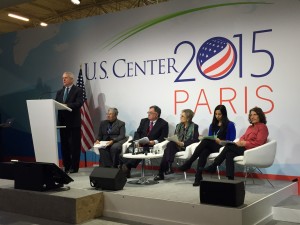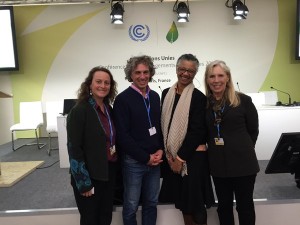A turning point, making history, success, a fraud, resistance as usual, a decisive agreement, a first step: these phrases were used in the media to describe the outcome of the recent United Nations climate change talks held in Paris.
On Dec. 12, nearly 200 countries reached an agreement to respond to global warming and published individual action plans on how each country will reduce greenhouse gas emissions. Countries will be required to review the plans every five years, starting in 2023. The plans and actions are contingent on securing funding — the agreement acknowledged that $100 billion in loans and donations will need to be raised each year to finance related projects — and ratification of the agreement will take place April 22, Earth Day, in New York City.
When asked to describe the 21st Conference of the Parties — the gathering’s official name — in one word, Gillian Bowser, research scientist in CSU’s Natural Resource Ecology Lab, said, “Energy.” Julia Klein, associate professor of Ecosystem Science and Sustainability, said, “inspiring.” “Complex,” was the word used by Dale Lockwood of the School of Global Environmental Sustainability.

During the conference, Bill Ritter, director of CSU’s Center for the New Energy Economy, sent an email and described “a great deal of excitement that we may get a deal in Paris that is purposeful and directional.”
Consensus driven by policymakers, business leaders
For Bowser, this was the eighth COP that she attended. She said that the large presence of business leaders and cities played a role in urging leaders to reach a consensus.
“Key business messages seemed to be about ‘stranded assets,’ based on rapidly falling prices of fossil fuels and investments in renewable energy, which have now surpassed investments in fossil fuel development,” she said. Graphics highlighting those investments were used in several meetings, Bowser said, most notably in talks by former Vice President Al Gore and at Conservation International’s meetings.

Bowser also said the “continuous” presence of Secretary of State John Kerry as well as a wide swath of CEOs from companies including Walmart and Ikea — combined with chief sustainability officers from Google, Kellogg and other prominent businesses — made a difference. “It was a bit dizzying to see all those folks wandering around the COP,” she said.
Bowser said she returned from the Paris talks with new fodder for her research, which focuses on women in sustainability. “Observing the role and function of the women’s group is fascinating,” she said.
“The women’s group went into panic mode when the first draft was released at one paragraph involving women’s equality and indigenous rights, which had been tagged for removal by the United States and Norway,” she said. “One observer ironically commented that we were in agreement with the Saudis over human rights for the first time! This led to a pile of meetings, running around checking text, trying to find negotiators and drafting language.”
Klein, who heads up the Mountain Sentinels Collaborative Network, a research consortium funded by the National Science Foundation, said the climate deal can help the more than 50 mountain regions around the world working on sustainability through the network. “We now have more confidence in the amount of climate change to expect in a given region and can assess how this is likely to interact with other pressures mountains are facing,” she said.
The Paris agreement’s mention of the importance of respecting the rights of indigenous and vulnerable people is also relevant, Klein said. “Through our work, we represent a large range of indigenous and vulnerable communities,” she said. “This text may help to provide further opportunities for advancing our work.”